Athar Ahmad, Student, Jamia Ahmadiyya UK
Opponents of Islam Ahmadiyyat say that Hazrat Mirza Ghulam Ahmadas, the Promised Messiah, claimed that our Holy Master, Hazrat Muhammad Mustafasa, received revelation in Persian. They ask for proof of this.
Often, the following source is quoted to make the case against the Promised Messiahas:
اور آپ سے پوچھا گىا کہ کىا زبان پارسى مىں بھى کبھى خدا نے کلام کىا ہے تو فرماىا کہ ہاں خدا کا کلام زبان پارسى مىں بھى اُترا ہے جىسا کہ وہ اُس زبان مىں فرماتا ہے ’’اىن مُشتِ خاک راگرنہ بخشم چہ کنم‘‘۔
“Again he [the Holy Prophetsa] was asked if Almighty God had spoken to any of His servants in the Persian language and he replied in the affirmative, adding that Almighty God says in the Persian language
اىن مشت خاک را گرنه بخشم چه کنم
which means, “What shall I do with this handful of dust (man) if I do not forgive him.” (Chashma-e-Ma‘rifat, Ruhani Khaza’in, Vol. 23, p. 382, Transl.: Review of Religions, January 1908, Vol. 7, No. 1, p. 10)
First, it will be shown with the help of some references that this saying was in circulation during and before the time of the Promised Messiahas and was classified by some scholars as a statement of the Prophetsa:
- Hafiz Husayn Karbala’i (d. 997/1589), known as Ibn al-Karbala’i, in his important hagiographical compendium focused on the saints buried in Tabriz, Rawzat al-jinan wa-jannat al-janan, records the following account:
مولانا شمس الدىن معرف رحمه الله فرمود که: نوبهٔ از مولانا مىر محمد خطىب پرسىدم که آىا حضرت عزت هرگز خطاب بفارسى کرده اند؟ مولانا فرمودند که حضرت مولانا سلماسى فرمودند که شنىدم از مولانا نجم الدين أسكويي و مولانا نجم الدىن فرمودند که صريح شنىدم از مولانا کمال الدىن باکوىى که مولانا فرمود که بمن رسىده است سند از حضرت رسول صلى الله عليه و آله وسلم که حضرت حق جل وعلا بزبان بى زبانى مى فرماىد که: چکنم من با اىن مشت خاك جز آنكه بيامرزم.
وفي بعض الرسائل للفاضل العلامة كمال پاشا زاده الرومي: «روى عن النبي صلى الله عليه و آله و سلم انه سأل اسرافيل عليه السلام : هل تسمعون كلام الله تعالى بالفارسية ، فقال : نعم كل يوم عند غروب الشمس يقول بالفارسية الدرية : چکنم با اىن ستمکاران جز آنکه بىامرزم.»
“Mawlana Shams ad-Din Mu‘arrif, may Allah have mercy on him, said: I asked Mawlana Mir Muhammad Khatib whether God, the Eminent, had ever spoken in Persian. He replied that Mawlana Salmasi said that he heard from Mawlana Najm ad-Din Usku’i, and Mawlana Najm ad-Din said that he clearly heard from Mawlana Kamal ad-Din Baku’i that he said that it has reached me through a chain back to the Messengersa that [God,] the Truth, may He be glorified and exalted, says in the tongueless tongue: ‘What can I do with this handful of dust except forgive?’
“And in one of the treatises of the eminent scholar Kamal Pashazade ar-Rumi (d. 940/1534)[, it says]: ‘It is narrated from the Prophetsa that he asked Israfilas: “Do you hear the words of God Most High in Persian?” He replied: “Yes, every day at sunset He says in Persian: “What can I do with these oppressors except forgive?”’”
The editor of the Rawzat mentions in the footnote to the quotation from Pashazade that this was also recorded along the same lines in the Tafsir of as-Surabadi (d. ca. 454/1101)
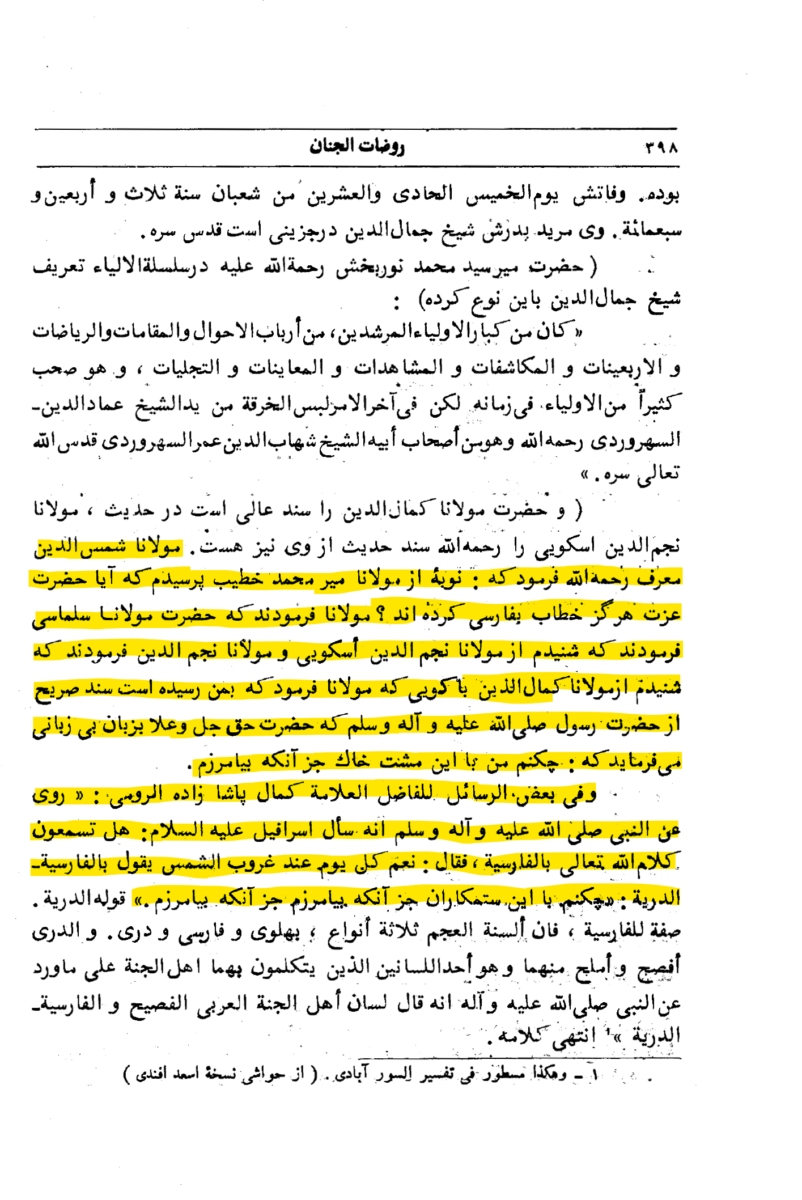
2. al-Mulla ‘Ali al-Qari (d. 1014/1606), the famous Hanafi hadith scholar, notes in al-Asrar al-marfu‘a fi l-akhbar al-mawdu‘a, his major work on fabricated ahadith:
وكذا موضوع ما ذكره بعض مشايخنا من العجم أنه ورد في الكلام القدسي باللسان الفارسي جه كنم باين كناه كاران كه نيا مرزم
“And likewise, what some of our shaykhs from the non-Arabs mentioned, that it occurs in the holy speech in the Persian tongue, “What shall I do with these sinners if I do not forgive them?”, is an unfounded hadith (mawdu’
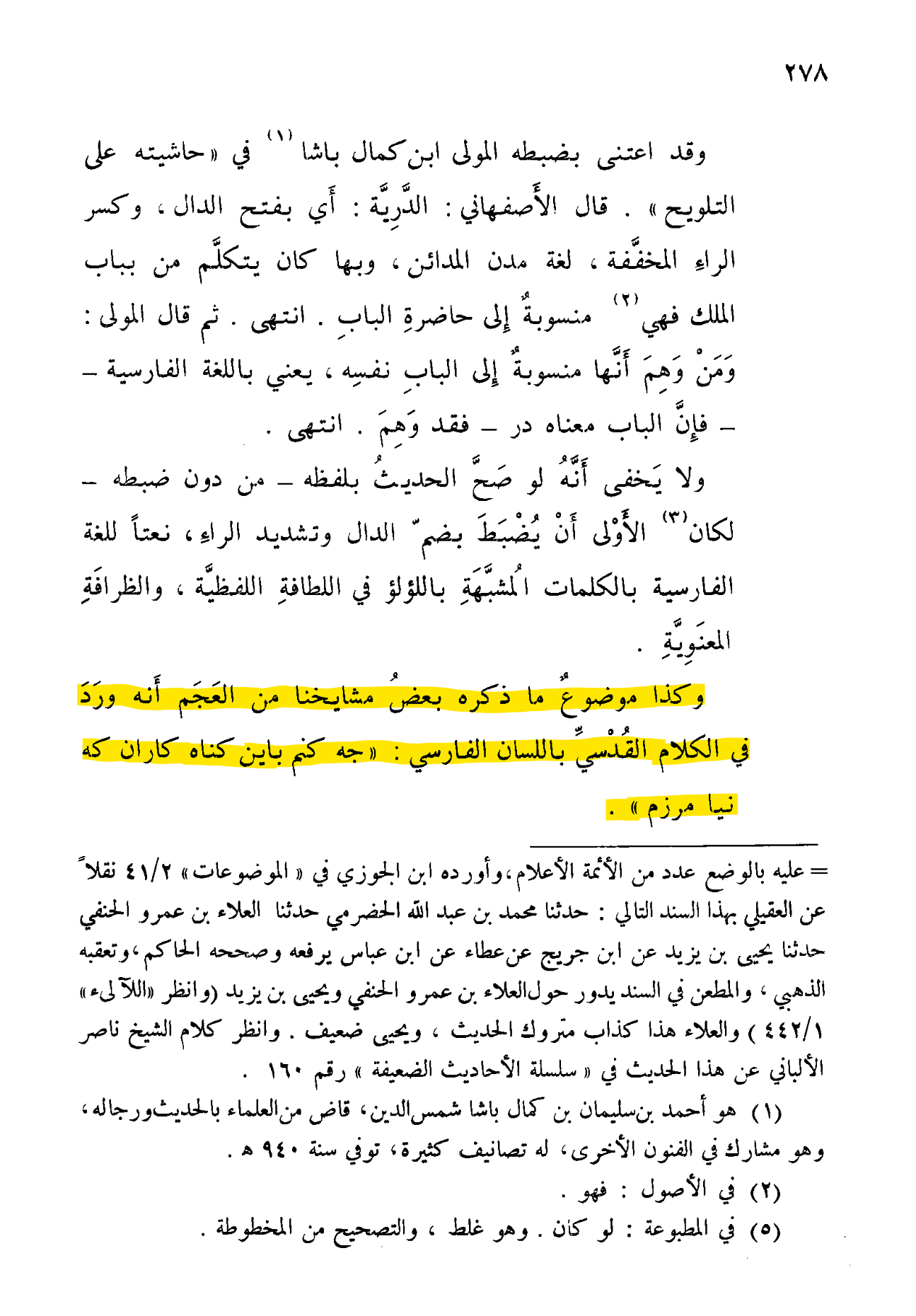
3. This hadith is also in Farhang-i Jahangiri, a Persian dictionary compiled in the 17th century by Mir Jamal ad-Din Husayn Inju (d. 1035/1626). This is one of the most important Persian-language dictionaries produced in Mughal India, often regarded as a standard in the realm of Persian lexicography. It reads:
در تفسىر دىلمى مسطور است که سأل رسول الله صلى الله علىه وسلم عن مىکائىل علىه السلام هل ىقول الله تعالى شىئا بفارسي قال نعم ىقول الله تعالى جل جلاله چون کنم با اىن مشت ستمگار جز اىنکه بىامرزم
“It is mentioned in Tafsir Daylami that the Messenger of Allahsa asked the archangel Michaelas: ‘Does Allah say something in Persian?’ He answered: ‘Yes, Allah the Exalted says: “What am I to do with this handful of oppressors but to forgive?”’”
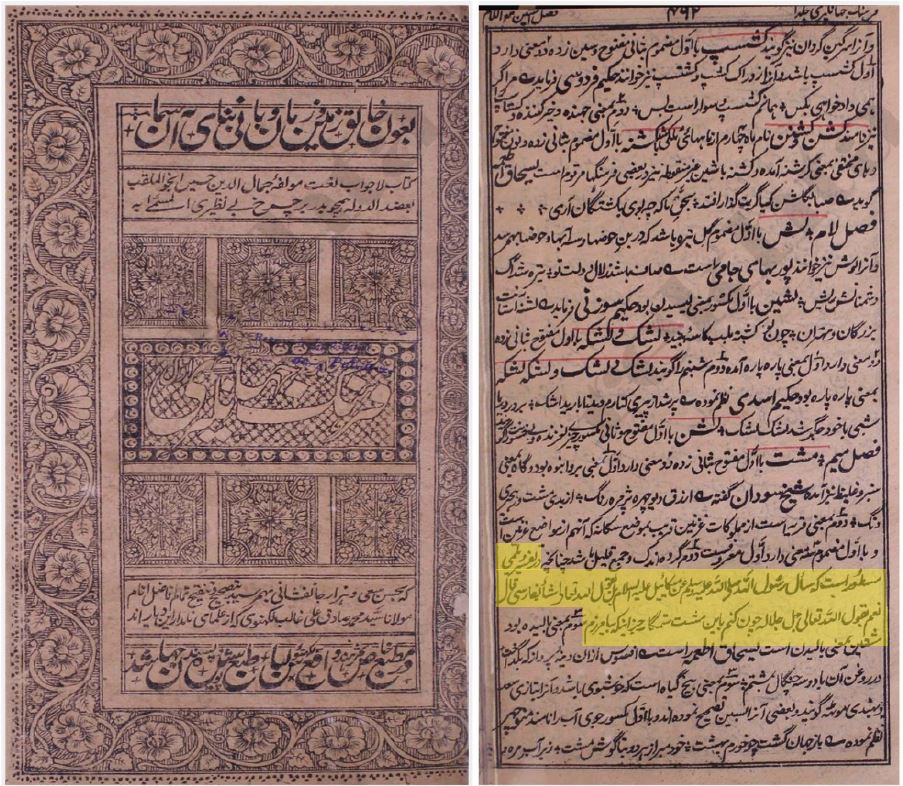
4. Evliya Çelebi (d. after 1096/1685), an Ottoman wayfarer and author, records in his voluminous travelogue Seyahatname, which is one of the greatest travel accounts in Islamic literature:
فارسى لسانى حقنده کمال پاشا زاده مرحوم (دقاىق الحقاىق) آدلى اثرنده شوىله بىورىىور: (قال في تفسىر الديلمى سأل رسول الله صلى الله عليه و سلم عن مىکائىل علىه السلام هل ىقول الله تعالى شىئا بالفارسىه؟ قال نعم ىا رسول الله ىقول فى صحف ابراهىم (علىه السلام) «چه کنم با اىن مشت خاک ستمکاران خبر آنکه پىارم دهم» […])
“The late Kamal Pashazade (d. 940/1534), in his work Daqa’iq al-haqa’iq, quotes regarding the Persian language as follows: ‘It is narrated in Tafsir ad-Daylami: “The Messenger of Allahsa asked Archangel Michaelas: ‘Does Allah the Exalted say anything in Persian?’ He replied: ‘Yes, O Messenger of Allah[sa], He says in the Scriptures of Abrahamas: “What shall I do with this handful of dirt of oppressors, except bring them a Message?”’”’”
The scholar by the name ad-Daylami, whose book is quoted here, is possibly the Zaydi Imam Abu al-Fath ad-Daylami (d. 444/1052).
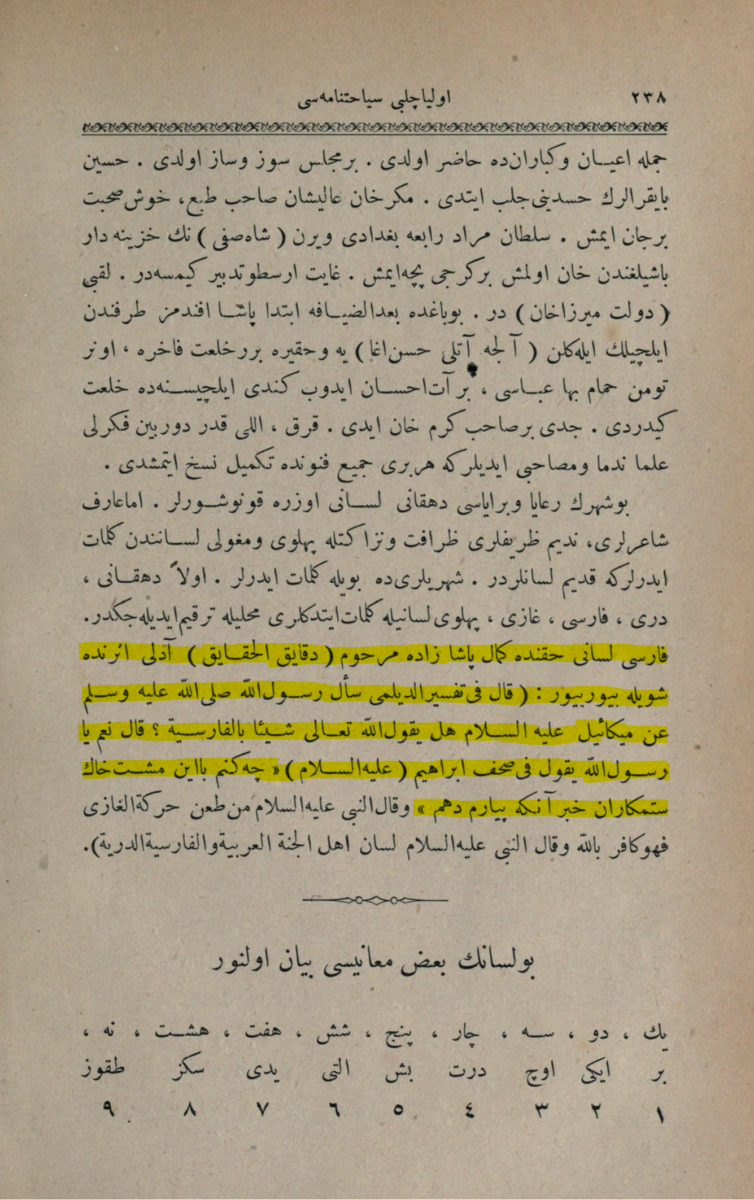
5. ‘Abd al-Aziz Pirharvi (d. 1239/1824), a scholar of Quran, hadith and Islamic philosophy, records this hadith in the second part of his work Kawthar an-Nabi fi ‘ilm usul al-hadith, which deals with fabricated traditions, (mawdu‘at) in the following way:
چکنم به اىن گناہ گاران که نىامرزم
“What am I to do if I do not forgive these sinners?”
And in the footnote, it is written:
قرأت فيه: اىن مشت خاك را گر نه بخشم چه کنم
“I have also read somewhere: ‘If I do not forgive this handful of dust, then what am I to do?’”
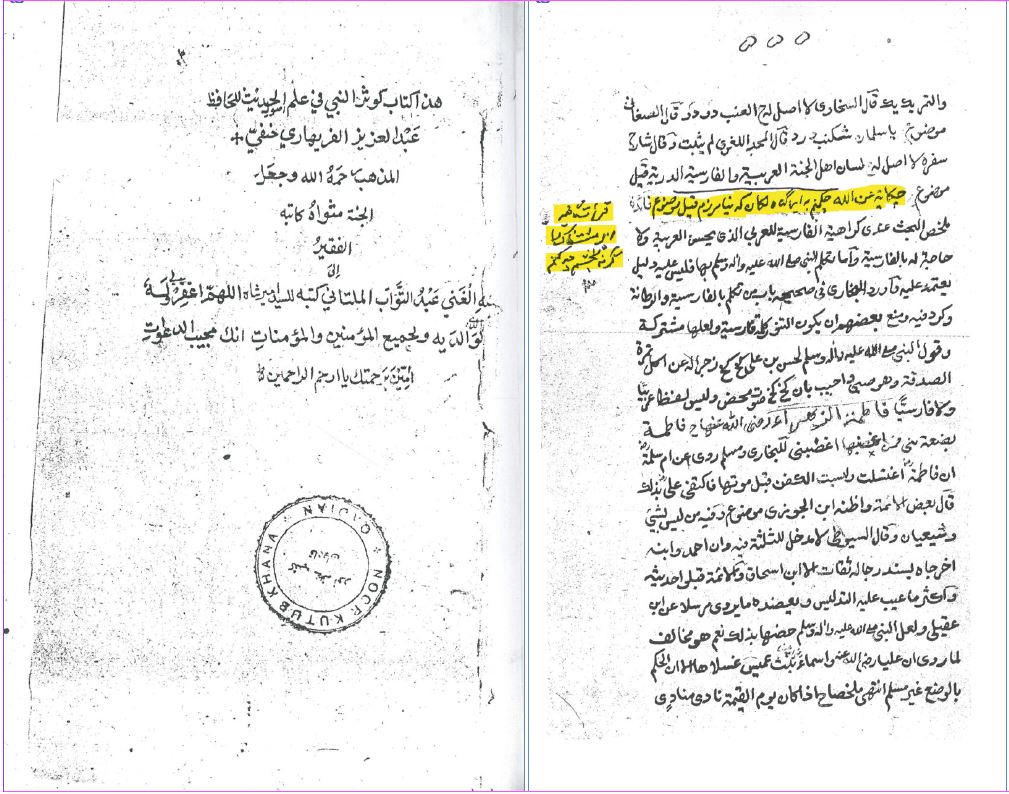
6. It is also written in the Malfuzat of Khawaja Shamsuddin Sialvi (d. 1300/1882), the spiritual leader of the Chishti Sufi order, also known as Shams al-‘Arifin:
“Later, a discussion on the subject of the word of God was initiated. He said: ‘God has also spoken in Persian language and that sentence is this:
چہ کنم باىں مشتِ خاک جز آنکہ بىآمرزم
“Sayyid Allah Bakhsh Langri asked whether the word of God is also in Hindi or not? He said: ‘His being is manifested in every language and appearance.’” (Pur Gohar, Urdu translation of Mir’at al-ashiqin, p. 287)
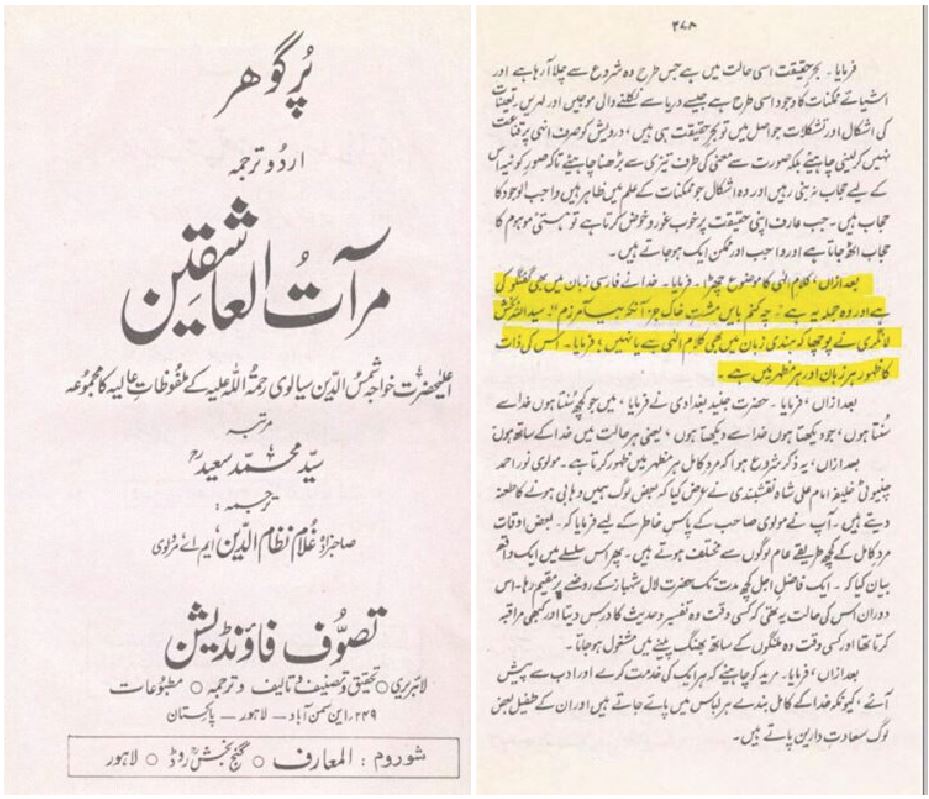
If our opponents studied Islamic literature, they would not raise this allegation against the Promised Messiahas as throughout the Hadith corpus it is well established that the Prophetsa used Persian and other non-Arabic words.
Proof of Prophet Muhammadsa speaking in Persian
In ahadith we find many examples of the Prophetsa to have spoken in Persian. For example, it is narrated that Abu Hurairara said:
“The Prophetsa set out in the early morning and I did likewise. I prayed, then I sat. The Prophetsa turned to me and said in Persian: ” اشِكَمَتْ دَرْدْ ” (i.e., Do you have a stomach problem)?’ I said: ‘Yes, O Messengersa of Allah.’ He said: ‘Get up and pray, for in prayer there is healing.’ (Sunan Ibn Majah, Kitab at-Tibb, Hadith 3458)
In fact, Imam al-Bukhari established a whole chapter on in this in the Kitab al-Jihad of his Sahih called: “Bab man takallama bi-l-farisiyya wa-r-ratana” – “Chapter on speaking in Persian and in an unfamiliar accent”
Imam al-Bukhari introduces the chapter with the following two verses:
وَاخۡتِلَافُ اَلۡسِنَتِکُمۡ وَاَلۡوَانِکُمۡ
“And the diversity of your tongues and colours” (Surah ar-Rum, Ch.30: V.23)
وَمَاۤ اَرۡسَلۡنَا مِنۡ رَّسُوۡلٍ اِلَّا بِلِسَانِ قَوۡمِہٖ
“And We have not sent any Messenger except with the language of his people” (Surah Ibrahim, Ch.14: V.5)
Hafiz Ibn Hajar al-‘Asqalani makes the following remarks concerning these two verses in Fath al-Bari, his most renowned commentary on Sahih al-Bukhari:
كأنه أشار إلى أن النبي صلى الله عليه وسلم كان يعرف الألسنة؛ لأنه أُرسل إلى الأمم كلها على اختلاف ألسنتهم، فجميع الأمم قومه بالنسبة إلى عموم رسالته، فاقتضى أن يعرف ألسنتهم؛ ليفهم عنهم ويفهموا عنه.
“It is as if he [Imam al-Bukharirh] indicated that the Prophetsa knew various languages because he was sent to all nations, regardless of their language, so all nations are his people with regard to the generality of his message. This necessitated that he knows their languages so that Hesa could understand them and they could understand him.” (Fath al-Bari, Kitab al-jihad wa-s-siyar)
In this chapter of Sahih al-Bukhari, a narration from Hazrat Abu Hurairara states that al-Hasan ibn ‘Alira took a date from the dates of the sadaqa and put it in his mouth. The Prophetsa said to him in Persian, “Kakh, kakh” كَخٍ كَخwith the intention of saying: ‘Don’t you know that we [the Prophet’s family and progeny] do not eat sadaqa.’ (Sahih al-Bukhari, Kitab al-jihad wa-s-siyar, Hadith No. 3072)
In various Persian dictionaries the meaning of ‘kakh’ is written to throw something away.
Imam al-Bukharira also mentions the following hadith:
حَدَّثَنَا عَمْرُو بْنُ عَلِيٍّ، حَدَّثَنَا أَبُو عَاصِمٍ، أَخْبَرَنَا حَنْظَلَةُ بْنُ أَبِي سُفْيَانَ، أَخْبَرَنَا سَعِيدُ بْنُ مِينَاءَ، قَالَ سَمِعْتُ جَابِرَ بْنَ عَبْدِ اللَّهِ ـ رضى الله عنهما ـ قَالَ قُلْتُ يَا رَسُولَ اللَّهِ، ذَبَحْنَا بُهَيْمَةً لَنَا، وَطَحَنْتُ صَاعًا مِنْ شَعِيرٍ، فَتَعَالَ أَنْتَ وَنَفَرٌ، فَصَاحَ النَّبِيُّ صلى الله عليه وسلم فَقَالَ “ يَا أَهْلَ الْخَنْدَقِ، إِنَّ جَابِرًا قَدْ صَنَعَ سُؤْرًا، فَحَىَّ هَلاً بِكُمْ
It is narrated by Jabir ibn ‘Abdillah: I said, “O Allah’s Messengersa! We have slaughtered a young sheep of ours and have ground one sa‘ of barley. So, I invite you along with some people.” So, the Prophetsa said in a loud voice, “O people of the Trench! Jabir had prepared su’r, so come along.” (Sahih al-Bukhari, Kitab al-jihad wa-s-siyar, Hadith No. 3070)
Su’r is a Persian word that means food for which people are invited to.
Thus, according to Imam al-Bukhari, in both of the above-mentioned ahadith, the Holy Prophetsa used Persian words.
These ahadith do not imply the Holy Prophetsa spoke Persian. Instead, they signify that there is no objection if Persian phrases were Arabised and used. These ahadith highlight the acceptance of such expressions that the Prophetsa used.
al-Jawhari, a grammarian and lexicographer, writes in his as-Sihah, one of the earliest and most significant dictionaries in the Arabic language:
تعريب الإسم الأعجمي أن تتفوّه به العرب على مناهجها
“The Arabisation of the non-Arabic noun is for the Arabs to pronounce them according to their methods.” (al-Sihah, bab al-‘ayn)
An important consideration
These objections are a result of narrow-mindedness. In the Quran we find that Allah the Almighty states:
وَمَا أَرْسَلْنَا مِنْ رَسُولٍ إِلَّا بِلِسَانِ قَوْمِهِ
“And We have not sent any Messenger except with the language of his people” (Surah Ibrahim, Ch.14: V.5)
It is evident from this verse that every prophet’s revelation was in their people’s language. But this applied only to the prophets before the Holy Prophetsa as is evident from the following hadith:
“Hazrat Ibn Abbasra narrated that Allah the Exalted gave excellence to Muhammadsa over the Prophetsas and over the dwellers of heaven. Some people asked, ‘O Abu Abbas, in what manner has Allah given him excellence over the dwellers of heaven?’ He said that Allah the Exalted says to the dwellers of heaven:
وَمَنۡ ىَّقُلۡ مِنۡہُمۡ اِنِّىۡۤ اِلٰہٌ مِّنۡ دُوۡنِہٖ فَذٰلِکَ نَجۡزِىۡہِ جَہَنَّمَ ؕ کَذٰلِکَ نَجۡزِى الظّٰلِمِىۡنَ
“And whosoever of them should say, ‘I am a God beside Him,’ him shall We requite with Hell. Thus do We requite the wrongdoers.” (Ch.21: V.30)
“And Allah the Exalted said to Muhammadsa:
اِنَّا فَتَحۡنَا لَکَ فَتۡحًا مُّبِىۡنًا ۙ- لِّىَغۡفِرَ لَکَ اللّٰہُ مَا تَقَدَّمَ مِنۡ ذَنۡۢبِکَ وَمَا تَاَخَّرَ
“Verily, We have granted thee a clear victory, that Allah may cover up for thee thy shortcomings, past and future.” (Ch.48: V.2-3)
“They asked, ‘And in what manner is he more excellent than the Prophetsas?’ He said that Allah the Exalted says:
وَمَاۤ اَرۡسَلۡنَا مِنۡ رَّسُوۡلٍ اِلَّا بِلِسَانِ قَوۡمِہٖ لِىُبَىِّنَ لَہُمۡ ؕ فَىُضِلُّ اللّٰہُ مَنۡ ىَّشَآءُ
“And We have not sent any Messenger except with the language of his people in order that he might make things clear to them. Then Allah lets go astray whom He wills.” (Ch.14: V.5)
“And Allah the Exalted said to Muhammadsa:
وَمَاۤ اَرۡسَلۡنٰکَ اِلَّا کَآفَّۃً لِّلنَّاسِ
“‘And We have not sent thee but for all mankind.’ [Ch.34: V.29]
“So, he sent him to the jinns and mankind.” (Mishkat al-Masabih, Kitab al-Fada’il wa al-shama’il, Hadith No. 5773; Sunan ad-Darimi, Hadith No. 47)
Authenticating this hadith, al-Hakim says the following:
هذا حديث صحيح الإسناد
“This is a hadith with an authentic chain of narration.” (Mustadrak al-Hakim, Kitab at-Tafsir, Hadith No. 3335)
This is to say that the Holy Prophetsa was sent to all nations – who speak all kinds of languages – not just to the Arabs who spoke Arabic.
Now if our Holy Mastersa, who was a messenger for all people, was given wahy – revelation – in the Persian language then why should there be any objection?
The above hadith clearly shows the Prophetsa came for all people and all nations.
Authentication of ahadith
Saints and Sufis of the ummah accept the authentication of ahadith through visions and revelations which the Holy Prophetsa taught us himself:
إِذَا سَمِعْتُمُ الْحَدِيثَ عَنِّي تَعْرِفُهُ قُلُوبُكُمْ، وَتَلِينُ لَهُ أَشْعَارُكُمْ، وَأَبْشَارُكُمْ، وَتَرَوْنَ أَنَّهُ مِنْكُمْ قَرِيبٌ، فَأَنَا أَوْلَاكُمْ بِهِ، وَإِذَا سَمِعْتُمُ الْحَدِيثَ عَنِّي تُنْكِرُهُ قُلُوبُكُمْ، وَتَنْفِرُ أَشْعَارُكُمْ، وَأَبْشَارُكُمْ، وَتَرَوْنَ أَنَّهُ مِنْكُمْ بَعِيدٌ فَأَنَا أَبْعَدُكُمْ مِنْهُ
“If you hear a narration from me that your hearts recognise, settles your hair and skin, and you see it as close to you, then I am most deserving of it. And if you hear a narration from me that your hearts reject, makes your hair stand and your skin crawl, and you see it as far from you, then I am the furthest from it.” (Musnad Ahmad, Hadith No.16058)
In Jami‘ at-Tirmidhi the following account is recorded:
حَدَّثَنَا أَحْمَدُ بْنُ مُحَمَّدِ بْنِ مُوسَى أَخْبَرَنَا عَبْدُ اللَّهِ بْنُ الْمُبَارَكِ عَنْ مَعْمَرٍ عَنْ خُصَيْفٍ قَالَ رَأَيْتُ النَّبِيَّ صلى الله عليه وسلم فِي الْمَنَامِ فَقُلْتُ يَا رَسُولَ اللَّهِ إِنَّ النَّاسَ قَدِ اخْتَلَفُوا فِي التَّشَهُّدِ فَقَالَ « عَلَيْكَ بِتَشَهُّدِ ابْنِ مَسْعُودٍ
“Ahmad ibn Muhammad ibn Musa narrated to us: ‘Abdullah ibn al-Mubarak informed us, from Ma‘mar, from Khusayf who said: “I saw the Prophetsa in a dream. I said: ‘O Messenger of Allah! The people disagree over the tashahhud.’ He said: ‘Follow the tashahhud of Ibn Mas‘ud.’” (Jami‘ at-Tirmidhi, Kitab as-Salat, Hadith No. 289)
Then in the introduction of Sahih Muslim, Imam Muslim writes:
حَدَّثَنَا سُوَيْدُ بْنُ سَعِيدٍ، حَدَّثَنَا عَلِيُّ بْنُ مُسْهِرٍ، قَالَ سَمِعْتُ أَنَا وَحَمْزَةُ الزَّيَّاتُ، مِنْ أَبَانَ بْنِ أَبِي عَيَّاشٍ نَحْوًا مِنْ أَلْفِ حَدِيثٍ . قَالَ عَلِيٌّ فَلَقِيتُ حَمْزَةَ فَأَخْبَرَنِي أَنَّهُ رَأَى النَّبِيَّ صلى الله عليه وسلم فِي الْمَنَامِ فَعَرَضَ عَلَيْهِ مَا سَمِعَ مِنْ أَبَانَ فَمَا عَرَفَ مِنْهَا إِلاَّ شَيْئًا يَسِيرًا خَمْسَةً أَوْ سِتَّةً .
Suwayd ibn Sa‘id narrated to us, ‘Ali bin Mushir narrated to us, he said:
“Hamza az-Zayyat and I heard from Aban ibn Abi ‘Ayyash something like one thousand hadith. ‘Ali said: ‘So I met Hamza and he informed me that he saw the Prophetsa [in a dream], and he produced for him what he heard from Aban. However, he [the Prophetsa] didn’t recognise any except a small amount of them – five or six [hadith]’.” (Sahih Muslim, Introduction, Hadith No. 79)
Imam as-Suyuti also believed in the authentication of ahadith through visions. Imam as-Suyutirh writes:
“One of the companions, who I think was Ibn ‘Abbasra, saw the Prophet Muhammadsa in a dream and he was made to remember a hadith he kept thinking of. Then he met one of the wives of the Prophetsa, who I think was Maymunara, and told herwhat happened. So, she got up and took out the mirror of the Prophetsa. He[Ibn ‘Abbasra] said that he looked into it and saw the Prophetsa.” (Tanwir al-halak fi ru’yat an-nabi wa-l-malak, p. 17)
Then Imam as-Suyutirh also writes in the same book that many from the salaf and khalaf said they saw the Holy Prophetsa and asked him about matters about which they were confused and he informed them of the solution.
Shah Waliyyullah Muhaddith Dehlvira says that I have ahadith in which the sanad is only me and the Prophet Muhammadsa:
“Amongst the ahadith that I collected in this booklet, I have received some directly from the Holy Pophetsa without any intermediary between him and me. In the remaining, there are two or more intermediaries between him and me.”
The Promised Messiahas also had ahadith authenticated through visions. Hazrat Mirza Bashir Ahmadra writes:
“Hafiz Nur Muhammad, resident of Faizullah Chak, conveyed to me in writing that on many occasions that the Promised Messiahas said: ‘I have met the Holy Prophetsa in a state of wakefulness several times and have had many ahadith authenticated directly through him, whether they are weak or of a lower standard in the eyes of the people.’ This humble one says that what is meant by meeting ‘in a state of wakefulness’ is a vision and the Promised Messiahas used to say that according to muhaddithun, there are many weak ahadith, however, in reality, they are correct and authentic.” (Sirat-ul-Mahdi, Vol. 1, p. 550, narration no. 572)

